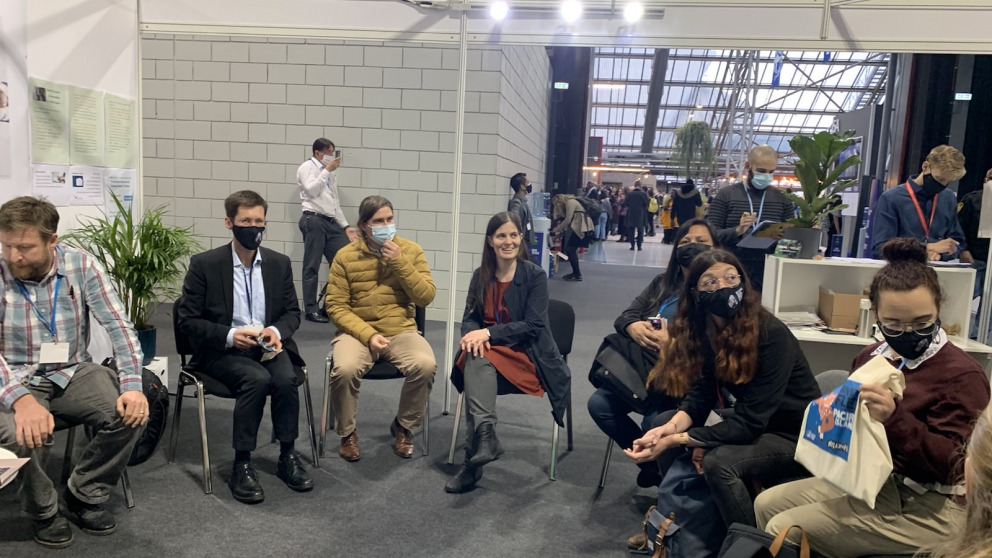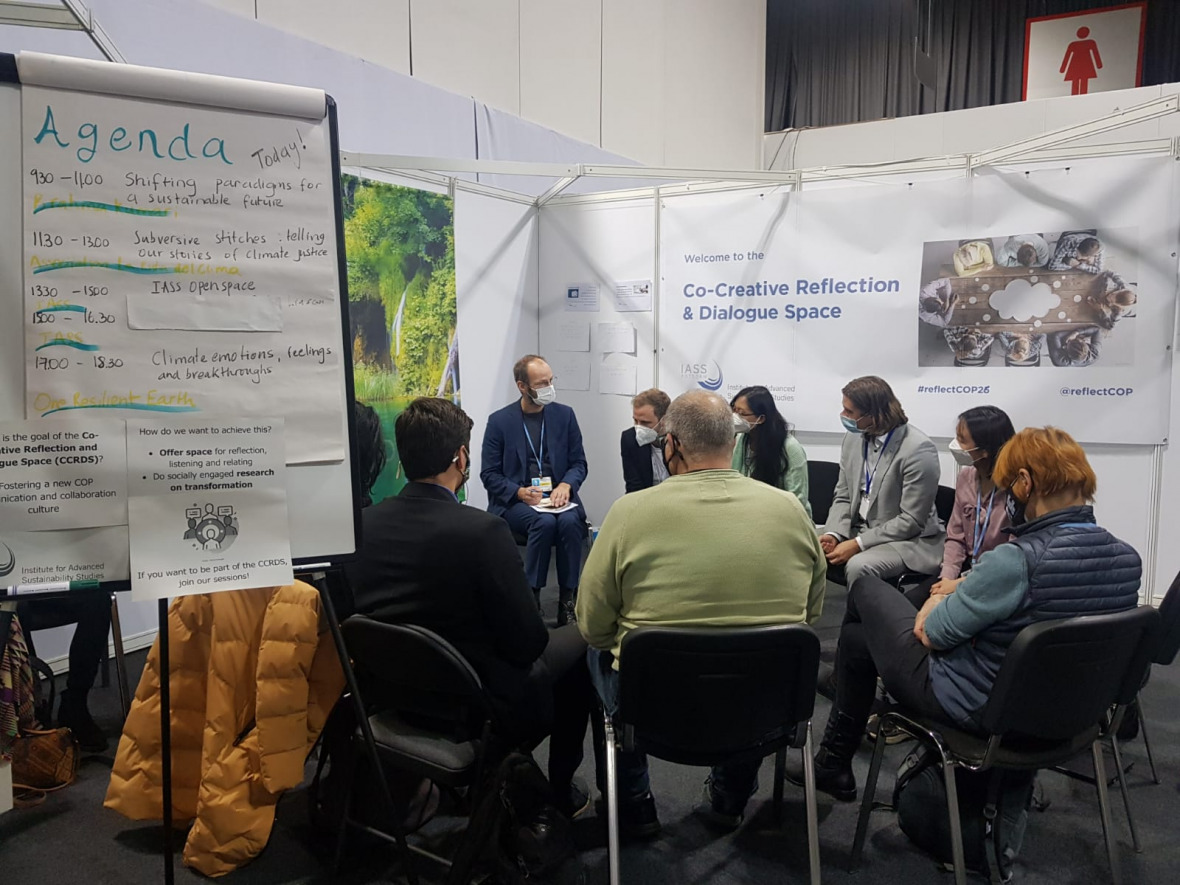Confronting fears - Strengthening trust
07.10.2022

A space for reflection, dialogue and co-creation at the UN Climate Change Conference COP27, in Sharm El Sheikh, Egypt, 7–18 November 2022
Context
We, the team of the IASS research project Transformative Spaces and Mindsets, are gearing up for the 27th UN Climate Change Conference at which the Parties to the United Nations Framework Convention on Climate Change (UNFCCC) will once again come together to forge a consensus on how best to mitigate anthropogenic climate change and develop adaptation strategies. Financing efforts to tackle the climate crisis will be one of the major issues at the negotiations in Sharm El Sheikh alongside the usual wrangling over Nationally Determined Contributions (NDCs).
The climate conference are generally attended by delegates from 195 nations as well as roughly 25,000 experts from a wide range of fields, who gather to observe the negotiations, present their findings in panel discussions, and lay the groundwork for future cooperation. As people around the world follow developments at these huge events each year, the conference follows a well-worn dramatic arc: The negotiations are painstaking and often get bogged down on the first day as the parties struggle to agree on an agenda. States largely view the negotiations from a national – or at best regional – perspective, taking a tactical approach and playing their cards close to their chests. In the end, each time the participating states have pledged to make the lowest possible (voluntary!) contribution – as if climate change were a territorial problem and a matter that states could tackle individually.
Mistrust runs high among the negotiating parties and especially between countries from the Global South and the Global North, and between East and West. The drama that played out in the final hours of the 2021 COP in Glasgow is still very much in the minds of many, when first India and then China failed to agree to end coal-fired power generation and scrap fossil fuel subsidies, decisively weakening the Glasgow climate agreement. Their veto softened the international commitment to take ambitious action that had been hashed out over two weeks of intense negotiations.
In light of this and other developments, feelings of panic, anger, despair and powerlessness are widespread among observer organisations. Young people in particular feel increasingly (emotionally) overwhelmed by the situation. Studies show that a large proportion of young people (75 per cent of youth aged 16–25) fear for their futures in the face of the climate crisis (Marks et al 2021). Climate anxiety weighs heavily on the mental health of adolescents in particular, but also affects adults. Some even experience suicidal thoughts. These difficult and challenging emotions are ‘in the air’ at the climate conferences, where they shape the atmosphere and leave their mark on the cultures of communication and interaction. At the same time, these emotions are not given an explicit space there; they are not openly addressed, reflected upon, or adequately considered in any way.
A team of researchers from the IASS has teamed up with partners (Christiane Wamsler, Lund University for Sustainability Studies; Niko Schäpke, Sustainability and Environmental Governance, Universität Freiburg) to observe the dynamics of the culture of communication and interaction at the UN climate conferences over several years and has set up a transdisciplinary research project on this topic: At COP24 in Katowice the researchers explored the possibility of creating spaces for communication at the COP with the aim of initiating authentic encounters and supporting trusting, transformative conversations between participants. The idea derives from the hypothesis that authentic encounters and dialogue can unlock transformative potential, alter mindsets and convictions, and broaden perspectives. Strengthening a global and unifying consciousness that goes beyond one's own political agenda or national identification, can be argued, to make an important contribution to social change and decision-making. After all, effectively countering global crises in the little time left calls for strong, global cooperation – something that is all too often in small supply.
The first interventions at COP24 in Katowice showed just how challenging the setting of the COP can be and that creating safe spaces that could nurture conversation would require a dedicated physical space. In response, the IASS rented a 25 square meter pavilion space at the COPs in Madrid (COP25) and Glasgow (COP26) and implemented the concept of a "Co-Creative Reflection and Dialogue Space (CCRDS)" for the first time.
CCRDS Research trip, publications - transformative research project
In Madrid, the primary objective was to determine whether it is at all possible to cultivate authentic and trusting communication in an environment like the UN Climate Change Conference and the design principles (toolset, skillset, mindset) needed to achieve this. In Glasgow, the researchers used the CCRDS to experiment with as many methods and formats as possible in order to explore their possibilities, potentials, and limitations (Wamsler at al 2020, Fraude et al 2021, Mar et al 2021, Mar et al in review, Schroeder et al in review). The research results and feedback from COP participants confirmed the concerns and hypotheses that underpin the CCRDS to such an extent that it was decided to continue the research project.
This year's climate conference, COP27 in Sharm El Sheikh, will see the CCRDS return. This time around, our research will focus on the complex topics of “(climate) fear and trust”. The research will address questions such as: What heightens emotions like fear at the COP? How does fear affect our work at the COP? How can COP participants build trust, and what happens when they do? How does the experience of trust influence one's work at the COP and collaborative processes or outcomes?
A second strand of research will look at what happens when innovative dialogue formats and a supportive culture of communication and relationships are used to host discussions of classical (natural) scientific issues, rather than conventional lectures or panel discussions. The CCRDS team is offering to support the moderation of discussion panels on designated scientific topics as part of this research.
The IASS welcomes applications for time slots at the CCRDS for both research strands. Further information and application details can be found here.
Information and contact details
- CCRDS [at] iass-potsdam [dot] de
- www.iass-potsdam.de/en/CCRDS
- Twitter: @ReflectCOP Hashtag: #ReflectCOP
References and previous publications from the CCRDS research project
- Fraude, C., Bruhn, T., Stasiak, D., Wamsler, C., Mar, K., Schäpke, N., Schroeder, H., Lawrence, M. Creating space for reflection and dialogue. Examples of new modes of communication for empowering climate action. GAIA 30/3 (2021): 174 – 180. https://doi.org/10.14512/gaia.30.3.9
- Mar, K.A., Fraude, C., Bruhn, T. Schäpke, N. Stasiak, D., Schröder, H. Wamsler, C., Lawrence, M.: Fostering Reflection, Dialogue and Collaboration among Actors at the UN Climate Change Conferences. IASS Policy Brief (October 2021), Potsdam, https://DOI:10.48481/iass.2021.028
- Mar, K.A., Schäpke, N., Fraude, C., Bruhn, T., Wamsler, C., Stasiak, D., Schroeder, H., Lawrence, M. Towards a new climate of communication at the COP: recommendations to foster collaboration with and among non-state actors. WIREs Climate Change. In Review.
- Marks, E., Hickman, C., Pihkala, P., Clayton, S., Lewandowski, E., Mayall, E., Wray, B., Mellor, C., van Susteren, L. (2021). Young People's Voices on Climate Anxiety, Government Betrayal and Moral Injury: A Global Phenomenon. http://dx.doi.org/10.2139/ssrn.3918955
- Wamsler, C., Schäpke, N., Fraude, C., Stasiak, D., Bruhn, T., Lawrence, M. G., Schroeder, H., & Mundaca, L. (2020). Enabling new mindsets and transformative skills for negotiating and activating climate action. Lessons from UNFCCC conferences of the parties. Environmental Science & Policy, 112, 227-235. https://doi.org/10.1016/j.envsci.2020.06.005




